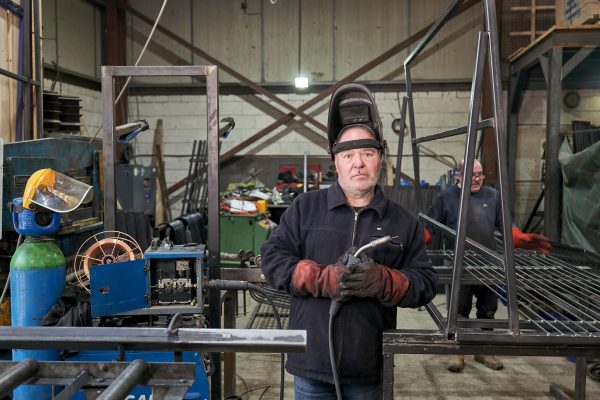
When it comes to welding operations, having the proper equipment can make the difference between a successful project and a dangerous situation. While welders often focus on torches, protective gear, and gas quality, one frequently overlooked piece of equipment is the welding cart itself. The right welding cart isn’t just a convenience—it’s an essential component that impacts safety, efficiency, and overall productivity in any welding environment.
The Foundation of Welding Safety
Safety should always be the top priority in any welding operation, and your choice of welding cart plays an important role in maintaining a secure work environment. Gas cylinders contain pressurized materials that can become extremely dangerous if not properly secured and transported. A quality welding cart provides the stable foundation needed to prevent cylinder movement, tipping, or falling during transport and operation.
Proper cylinder securing mechanisms, including chains and bands, ensure that oxygen and acetylene tanks remain upright and stable throughout the welding process. This stability is particularly important when working on uneven surfaces or when moving between job sites. The consequences of an improperly secured cylinder can range from work delays to serious injuries, making cart selection a critical safety decision.
Understanding Capacity Requirements for Your Application
Different welding projects require different gas cylinder sizes, and your cart must be capable of safely handling your specific capacity needs. Small welding carts typically accommodate 40 cubic feet of acetylene and 50-80 cubic feet of oxygen, making them ideal for light-duty work and portable applications. These compact units offer excellent maneuverability in tight spaces while providing adequate gas supply for smaller projects.
Medium-size carts can handle 145 cubic feet of acetylene and 244-330 cubic feet of oxygen, striking a balance between portability and extended operation time. For heavy-duty industrial applications, large carts accommodate even bigger cylinders, including 100-pound propane tanks, ensuring continuous operation for extended periods without frequent cylinder changes.
Wheel Selection and Mobility Considerations
The type of wheels on your welding cart significantly impacts both maneuverability and durability in different work environments. Understanding your specific mobility needs will help determine the best wheel configuration for your operations.
- Solid rubber tires (7″, 10″, 14″, 16″): Provide puncture-proof reliability and smooth rolling on concrete floors, making them ideal for indoor shop environments and smooth surfaces
- Pneumatic tires (16″): Offer superior shock absorption and easier rolling over rough terrain, perfect for outdoor construction sites and uneven surfaces
- Flat-free tires (16″): Combine the benefits of pneumatic cushioning with puncture-proof reliability, eliminating downtime from flat tires
- Steel wheels (18″, 24″): Provide maximum durability for heavy-duty industrial applications and can handle the roughest conditions and heaviest loads
Construction Quality and Long-Term Durability
The construction quality of your welding cart directly impacts its lifespan and reliability under demanding conditions. Heavy-duty steel construction ensures the cart can withstand the rigors of daily use, cylinder loading and unloading, and transportation between job sites. Welded joints should be clean and strong, while the overall frame design should distribute weight evenly to prevent stress concentrations.
Quality powder coating or paint finishes protect against corrosion, which is particularly important in outdoor environments or facilities with high humidity. The securing mechanisms, including chains, bands, and lifting eyes, should be made from corrosion-resistant materials and designed to handle repeated use without failure. Investing in a well-constructed cart reduces maintenance costs and prevents unexpected failures that can disrupt operations.
Maximizing Workplace Efficiency and Productivity
The right welding cart enhances workplace efficiency by reducing setup time, minimizing cylinder changes, and improving overall workflow. Carts with appropriate capacity reduce the frequency of cylinder replacements, allowing welders to focus on their work rather than equipment management. Easy-rolling wheels and well-designed handles reduce the physical effort required to move equipment, decreasing worker fatigue and increasing productivity.
Specialized features like lifting eyes enable crane operation for heavy cylinder loading, particularly valuable in industrial settings with overhead lifting equipment. Three-in-one cart designs provide additional versatility by accommodating different cylinder configurations, making them ideal for shops that handle various welding applications with different gas requirements.
Cost Considerations and Return on Investment
While the initial cost of a quality welding cart may seem significant, it’s important to consider the long-term value and return on investment when making your selection.
- Safety cost avoidance: Preventing accidents through proper cylinder securing can save thousands in potential injury claims, equipment damage, and regulatory fines
- Productivity gains: Reduced setup time and fewer cylinder changes translate to more billable hours and faster project completion
- Maintenance savings: Quality construction reduces repair costs and extends service life, lowering total cost of ownership
- Versatility value: Multi-configuration carts eliminate the need for multiple specialized units, reducing overall equipment investment
Making the Right Choice for Your Operation
Selecting the appropriate welding cart requires careful consideration of your specific operational needs, work environment, and safety requirements. Small operations may benefit from portable carts with solid tires for shop use, while construction companies need pneumatic-tired units that can handle outdoor terrain. Industrial facilities often require heavy-duty carts with steel wheels and lifting capabilities for maximum durability and efficiency.
Anthony Carts specializes in manufacturing high-quality welding carts and gas cylinder cages designed to meet the demanding requirements of professional welding operations. From small portable units to heavy-duty industrial carts, their comprehensive product line ensures you can find the right solution for your specific needs. Contact Anthony Carts today to discuss your welding cart requirements and discover how the right equipment can improve your operation’s safety, efficiency, and productivity.

